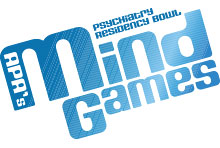Finalist Resident Teams Announced for MindGames
Abstract

The three institutions whose teams of residents were the finalists in this year’s MindGames competiton—the quiz show-like contest pitting residents in a test of psychiatric knowledge—are SUNY Downstate Health Science University, Brooklyn; New York Presbyterian/Weill Cornell Medicine; and the University of Arizona, Tucson.
The final competition, which has become a popular attraction at the Annual Meeting, will not occur this year. Due to public health concerns around the COVID-19 pandemic, the meeting cannot be held.
These are the triumphant residents for the three institutions:
SUNY Downstate Health Science University at Brooklyn: Rishab Gupta, M.D., Rebecca Parra, M.D., and Amvrine Ganguly, M.D.
New York Presbyterian/Weill Cornell Medicine: Charles Shaffer, M.D., Leonid Kapulsky, M.D., and Joseph Stujenske, M.D., Ph.D.
University of Arizona, Tucson: Michelle Singh, M.D., Philip Lam, D.O., and Jonathan Lavi, M.D.
MindGames is open to all psychiatry residency programs in the United States and Canada. The preliminary competition is in February, when teams of three residents take a 60-minute online test consisting of 150 multiple-choice questions. The questions follow the ABPN Part I content outline, covering both psychiatry and neurology, with a few difficult history-of-psychiatry questions. The winners, announced earlier this year at the annual meeting of the American Association of Directors of Psychiatric Residency Training in Dallas, are the three top-scoring teams with the fastest posted times. ■



